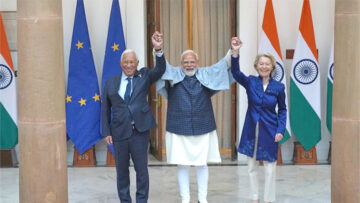
When it comes to winning a brand’s trust as their nominated supplier, quality of interlining is non-negotiable—whether it’s for a premium collection or an economical line.
“Every brand has strict criteria, including shrinkage, peel bond strength, heat shrinkage and wash performance. Missing any one standard means rejection,” stressed Romil Shah, Director, Reliable Interlinings LLP, a manufacturer of cuff and collar fusible interlinings, along with pre-cut parts like shirt collars, cuffs, patti rolls and belt rolls. These are tailored from pure cotton and allied fabric materials alongside a slight integration of synthetically made compounds.
The collars are structured with starched cotton fabric and other materials to make them rigid and durable. These come in many styles such as button-down, cutway, mandarin, Chinese, casual and formal collars.
He highlighted that amongst the company’s standout offerings is the Reliable 8 Series Interlinings, which has successfully cleared stringent tests and earned the trust of several top-tier brands.
The 8 Series is completely free from yarn contamination, which makes it ideal for pure white shirts. For formal, casual and partywear shirts, it gives the collar a voluminous and soft look. It can also be used for cotton trousers waistband and can sustain more than 50 washes.
Since there’s no contamination, there’s virtually zero wastage and no production loss. For the uninitiated, yarn contamination usually refers to unwanted coloured fibres that appear during fabric production. These can show up after a few metres and cause visible flaws on white or any light shade shirts. To avoid this, such collars are often rejected or used for darker-coloured garments where the flaw won’t be visible.
Romil also noted that even their budget options stay soft after more than 50 washes, while preventing common problems like shrinkage, bubbles and wrinkles. In addition, the company promises a six working day turnaround time and backs its sales with technical support. “If a manufacturer sends us their shirt fabric, we can recommend the most suitable interlining. We also have a mini lab where we test things like shrinkage and peel bond strength,” Romil said.
He added that their overseas clients often request certifications. “The most common ones are OEKO-TEX and ISO and we provide them as needed.”
Based in Vasai, their 19,000 sq. ft. manufacturing facility is ISO 9001:2015 certified with an annual production capacity of 91 million collars and cuffs, plus 2.5 million linear metres of plackets and waistbands. They make collars in white and charcoal, which cater to most shirting needs.
To further enhance efficiency, the company has developed customised machines capable of handling fabric widths from as narrow as 6 mm to over 1100 mm. “This helps maintain the correct shape of collars, cuffs, plackets and waistbands. It also enables us to cut nonwoven fabric used in other industries allowing us to serve a broader market,” explained Romil.
He mentioned that many garment factories use folder machines to attach interlinings. In such cases, if the cutting of collars or plackets is not precise, these machines can’t perform to their full capacity. “When manufacturers order pre-cut interlinings for collars, cuffs or plackets, it helps them reduce waste, manage inventory better and ensure precise shapes. Instead of buying a full 100-metre roll and storing the excess, pre-cut interlinings are more efficient and cost-effective,” highlighted Romil.
He concluded, “The interlining market is vast and companies that uphold reliability and ethics will always find space to grow. My message is… make sure your interlinings are reliable.”’






